Searching for Sunday
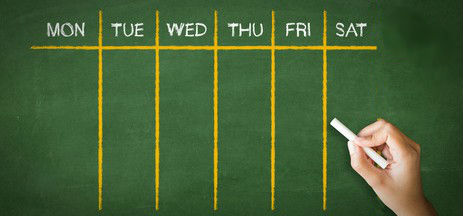
How to get alongside of the “nones” of religion and join them in humanity’s search for God.
Searching for Sunday
a sermon by Rev. J. Christy Ramsey
Click the title above for a mp3 recording
Audio from Holy Cross Lutheran Church in Reno, Nevada in July 2017, edited from a flawless transcription made by edigitaltranscriptions all errors are mine.
Sermons also available free on iTunes
 Corn. So much corn. You cannot imagine how much corn there is in Indiana. You think you can? There’s more. There is so much corn there. I’m talking corn that grows up 10 feet tall. This is before GPSes. You’d need a periscope to try to drive because you cannot see anything but corn. And they think that’s normal in Indiana. I brought two children into the world. Well, I didn’t. I stood around and watched my poor wife scream, curse at me when she brought the kids in the world in Indiana. But they came into corn country. I’m telling you, there was corn squash. There was corn chowder. There was corn soup. Oh, yeah. There was corn casserole. Corn, corn, corn. In fact, in a small town you did not have to worry about locking your car doors anytime except August because, if you did not lock your car doors and roll up your windows, you would come back, and your back seat would be full of corn. It’s everywhere. And then once it was harvest, those little husks, the little husks which we call the “tumbleweeds of the Midwest,” they just blow everywhere. There’ll be corn husks there. You’d sweep it off your porch. Oh, corn, corn, corn.
Corn. So much corn. You cannot imagine how much corn there is in Indiana. You think you can? There’s more. There is so much corn there. I’m talking corn that grows up 10 feet tall. This is before GPSes. You’d need a periscope to try to drive because you cannot see anything but corn. And they think that’s normal in Indiana. I brought two children into the world. Well, I didn’t. I stood around and watched my poor wife scream, curse at me when she brought the kids in the world in Indiana. But they came into corn country. I’m telling you, there was corn squash. There was corn chowder. There was corn soup. Oh, yeah. There was corn casserole. Corn, corn, corn. In fact, in a small town you did not have to worry about locking your car doors anytime except August because, if you did not lock your car doors and roll up your windows, you would come back, and your back seat would be full of corn. It’s everywhere. And then once it was harvest, those little husks, the little husks which we call the “tumbleweeds of the Midwest,” they just blow everywhere. There’ll be corn husks there. You’d sweep it off your porch. Oh, corn, corn, corn.
Well, things came to a head, and we moved to Ottawa. A little less corn. Still a lot there. Lot of corn. And then I got the call. I got the call from my college roommate saying, “Let me pay you twice as much to work half as hard and get every weekend off.” And I said, “Yes, Lord. Yes, Lord. I hear you, Lord.” I’m going to Greensburg, Pennsylvania, where there’s no corn. Very little corn. Lot of coal, not much corn. So I took those poor, poor children from the small town rural environment with all they knew, all they grew up, and I brought them to the semi big city of Greensburg. And, yes, they had a bus service. I’m telling you, metropolis.
And I thought they were doing okay. Little bumps and bruises along the way, you know, because now they’re in the big city. We went there right at the beginning of school. And I thought they’re being all right. I think they’ll be okay. I think I was kind of excited. And my daughter Rachel, God bless my daughter Rachel, she says what she thinks very loudly. I don’t know where she gets it. Her mom is the most demure and quiet person you would want to meet. It’s a mystery.
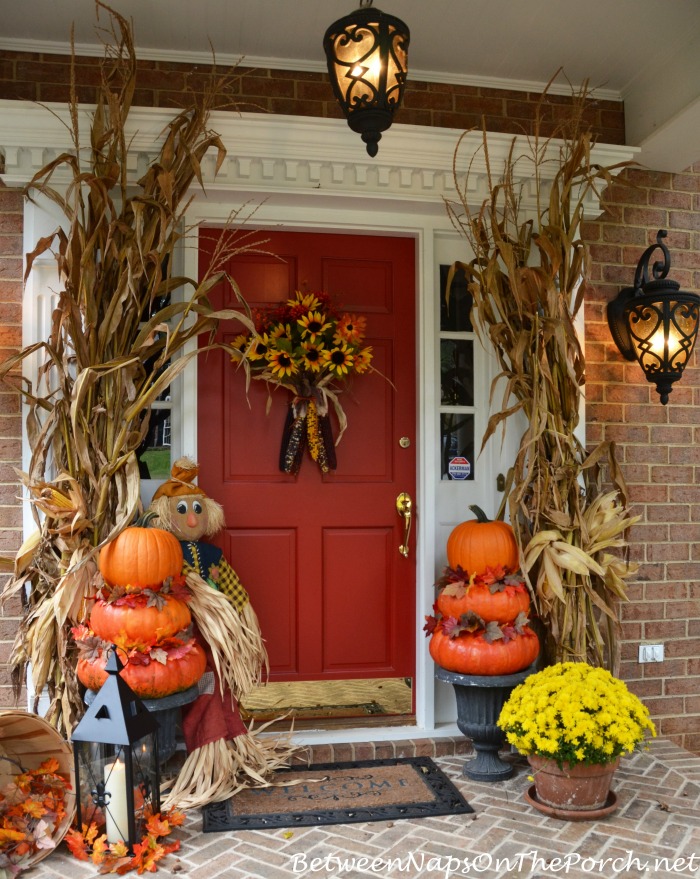 Well, on one of these occasions when she said what she thought, because everybody needs to know it right now and at full volume, it happened with this. Richard? This happened. I don’t know if you can see it. But come autumn, she looked at the neighbors, and they had corn husks on their porch, tied up as decorations. She was freaked out on this. She asked them, “Why do you put trash on your porch?” And then they told her that, well, “We bought it for decoration.” She goes, “You paid for this?” She was totally freaked that there was husks on the porch. Trash, trash on your porch, and you think it’s pretty. What is wrong with these people? What has my dad done to me to bring me here?
Well, on one of these occasions when she said what she thought, because everybody needs to know it right now and at full volume, it happened with this. Richard? This happened. I don’t know if you can see it. But come autumn, she looked at the neighbors, and they had corn husks on their porch, tied up as decorations. She was freaked out on this. She asked them, “Why do you put trash on your porch?” And then they told her that, well, “We bought it for decoration.” She goes, “You paid for this?” She was totally freaked that there was husks on the porch. Trash, trash on your porch, and you think it’s pretty. What is wrong with these people? What has my dad done to me to bring me here?
What do you do? What do you do when someone values trash? What do you do when someone posts on your Facebook page, with a big thumbs up, trash? What do you do when you go to Thanksgiving dinner with a Trump supporter? What do you do when you go to that with a lover of Hillary? What do you do? Richard. You’ve got some choices. You can laugh, either out loud or the eye roll, very popular with the young people. You can laugh out loud at them. They don’t know what they’re doing. They know nothing. Ha ha, so funny, trash on the porch, and they pay for it, ha ha ha. Oh. Or you can yell. You can yell, either right at your screen or at them. You can yell and be angry and call them names. You big snowflake. You racist. You, oh. You are just whatever.
You can yell. You could leave. You can leave. I’m in groups, and I call up people, and I say, “Hey, we haven’t seen you.” You know, support groups where people get help, real help. And they said, “I can’t come anymore because, you know, I thought I knew her, and she voted for – how could she do that? I can’t come back.” “I’ll never go to Thanksgiving dinner as long as Uncle Art’s there. I just can’t stand his diatribes.” You can leave. You can yell. You can laugh. Those are all options.
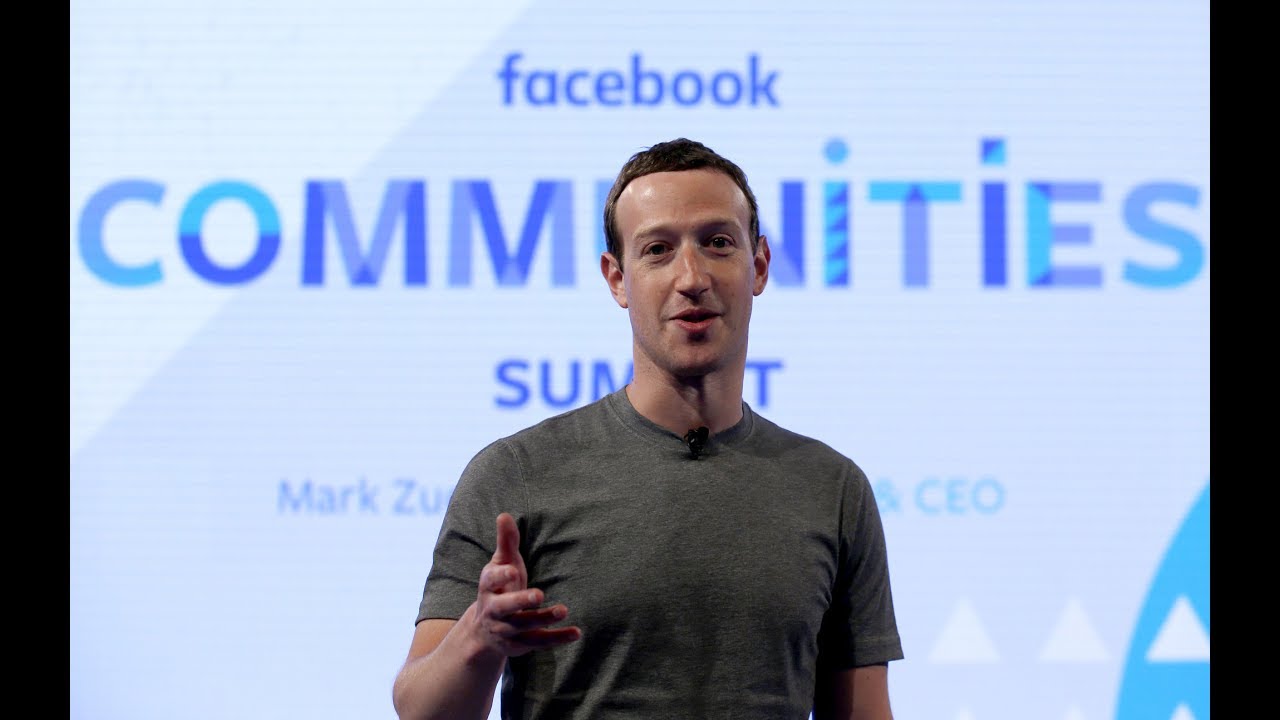
This guy’s the problem. Public Enemy No. 1, Mark Zuckerberg, founder of Facebook. Maybe our next President, the way things are going, who knows. He’s out there running for office. He doesn’t say that, but he is. But he has come to this great discovery. Have you seen it? Did you see it? Do you read the craziness that I read on Facebook and Twitter that talked about how Facebook wants to be the church? Did you see that? He didn’t say that; but, you know, that gets you clicking on the old Facebook things, which is, again, back to him.
But he had what he called the First Annual Community Facebook Summit. He’s trying to make Facebook into a big community. He says that he’s a little disappointed. He likes meaningful communities. He had a big summit. He wants everybody joined up in community. In fact, he changed the whole mission statement of Facebook, give people the power to build community and bring the world closer together. That is Facebook’s mission: Bring the world closer together. And he points out – and he did this on the month that they got – how many people log into Facebook on a month? Not here, but throughout the world. How many people do you think? Go ahead, you can sing out. This isn’t a Presbyterian church….
What? Five million? That’s a lot. A billion? They’ve passed two billion. Two billion people a month. That’s not just people, you know, just had an account last year or something like that, or signed in to look at baby pictures. Two billion people a month sign into Facebook. And Mark is upset because only one out of 20 is involved in a meaningful community. One out of 20. That’s still 100 million people. That’s still a lot of people, Mark. And so he’s about trying to build community. And he takes a look at the church as a way to go about building community.
He says a church does four things. And this is Mark, not me, so don’t be grading on a curve because this isn’t the seminary answers. Four things, not the great signs of the church, we Presbyterians that are slumming it here at the Lutherans: inspire, motivate, give safety, and support. Inspire, motivate, help each other in times of crisis, and support each other in just the regular times. That’s what he’s trying to do.
I think that’s pretty good. Inspire. Give them something, there’s something better out there, something better you can do. You can be better. You can do better. Motivate. Come on. Let’s do it. We’re all getting together this Sunday. We’re going to go do this. Let’s go. Come on, you know you want to. And then safety. In times of crisis, how many times have you reached out to a church person, and they were there? I hope at least once or twice. I hope you didn’t have that many crises. You know? I hope so. And support in other times.
I remember when we moved to that Greensburg place it was so strange because, all the time in my adult life, when I moved to a new community, I was like, put right in a slot. You know? I had friends. I had a social life. I had connections. I had people telling me – I had, at one church, I had a hair appointment. I swear that he goes, “Well, I told her you were coming in to get your haircut because the pastor always goes to this one.” So it was easy. It was kind of creepy, but it was easy. And then I went to Greensburg, and no one – I couldn’t even get the water company to return my call, you know.
And my son – my son, great guy, great guy. He barely talks. Don’t know why. Me and Rachel, and then him coming along, there wasn’t any oxygen left. He got in a horrendous bicycle accident, horrendous. It seems that in Pennsylvania they have something that they don’t have in Indiana. It’s called, uh, hills, that’s it. And he discovered hills on his bicycle and had a terrible breakup. Oh, it was pretty – it’s a whole ‘nother sermon. We won’t go there. Come at 1:00. I’m going to guest preach, too. I’m just double hitting it today.
But I got in the helicopter with him, say, “I’m going.” He’s in the helicopter; I’m going with him. So I got the helicopter ride. And my poor wife – to Pittsburgh, which was 30 miles away. Because from the fire department, somebody goes on the helicopter, they usually don’t come back. And I was, like, freaking major and trying not to let my wife see it. And my wife, I just left her. And she goes, “I don’t know how to get to Pittsburgh. I don’t know where the hospital is. What am I going to do?” So she called our pastor, who found a church member to say, “I’ll take you. You just follow me. I’ll get you there.”
Support in times of crisis. Help in crisis. That was huge help. We support each other, too, don’t we? We support – I tell the kids, when they’re doing things, they want to do a presentation, they’re all nervous and some, and they want to talk about their mission trip or Sunday school, their project or whatever. They’ve got Girl Scout cookies. Whatever project it is, you’ll never find a more supportive community. Don’t worry about it. Get out there and just do your best, they’ll love you. Because that’s what we do. We support each other, even when we are not in crisis. This guy caught it, Zuckerberg. We don’t know if he’s a big church person. Don’t think so.
What does Paul do? What does Paul do when he goes to this place? Richard, got it? What does Paul do? I’ll get to that in a minute. Don’t freak. What does Paul do when he goes to this place that is very strange? This is like God Central. Every god that was any god would have – it was like, you know, a Walmart has that place, everybody goes to Walmart. You’ve got to be at Walmart. If you’re going to be anybody, you’ve got to go to Bentonville, Arkansas and have a little office there and be a – it’s like Athens in God times. Any god is going to be at Athens, going to be hanging out there.
And there he is. It’s like gods everywhere. Everywhere you look, there’s a statue, a shrine, a temple, something to gods all over, from all over the place. I’m telling you, what is it like? It would be like Paul was a community organizer in Trump Tower. With a press badge. Okay? It’s like that. That is how out of place Paul is there. The good Jew who’s now a Christian. And it’s a crazy hard place to be. What does he do?
Now, he could go around and say, “You paid money for this trash? We throw away this stuff where I’m from.” No. He connected with them. He says, you know, “I went around your city, looked at your stuff.” How respectful. “I see you are a religious people.” Isn’t that great? Great opening. “I see you’re a religious person.” We’re together on that.
And I even read some things. I read an unknown god. Can you sound that out, you Greek speakers in the congregation out there? Maybe we got one, I don’t know. Ag-nos-tic.
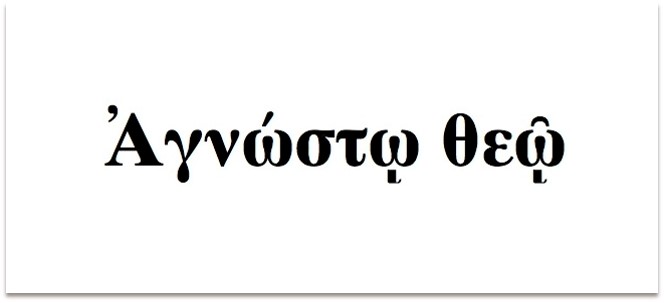
That’s agnostic god. Agnostic god, unknown god. Ever hear of the Agnostics? Ever heard of them? Don’t know? Maybe god. Maybe not. Don’t know. Spiritual, not religious. You know, spiritual not religious, that’s like saying I like water, but I can’t stand the plumbing. It’s kind of helpful to have the plumbing with the water, but okay. Go ahead, Richard, go on. There. You’d better know about the Agnostics.
Now, you look at religion in America, and I want to tell you right now, I’d like to declare an update on the war on Christmas. Failure, big failure. Not doing well at all. Because as we know, Christmas has surrounded Thanksgiving. It’s about ready to give up. And it’s on the march toward Halloween; you know. Christmas is winning; all right? We’ve got 71 percent; Nevadans, 66. Come on. Seventy-one percent Christian. Now, 6 percent is the other faith. You know, you go on – I don’t know if anybody’s hair’s on fire about all the Muslims everywhere, and the Hindus, and the Buddhists and the – oh, terrible. That’s 6 percent.
If you want to get your hair on fire, 23 percent, I think it’s up to like 27 percent in Nevada, are “nones.” Here’s where our hair should be on fire. Twenty-three percent have that unknown god in their front yard. Richard, go ahead and go on next. And you say, oh, what’s the big deal? We’re winning, 71 percent. Winning. And you look up here, and this is another chart. Oh, when Pastor Christy came he had charts, diagrams, all sorts of wonderful things. Greek. I tell you, Scott, he really did his homework because he only preaches once a year.
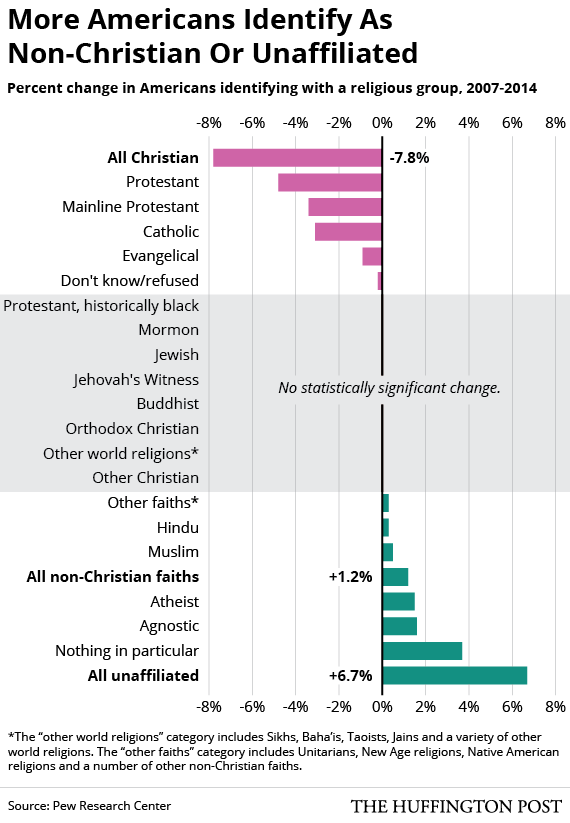 Anyhow, look up here. All Christians down. Going to the right is bad. I don’t know if I’m swiping right or left, but going to the right is bad. We’re going down 7.8 percent over the last seven years, 2007—2014. We’re down 7.8, all Christians. All Christians. All Christians. But look. Look at our friends. Well, you got all non-Christians, 1.2. Oh, hair on fire. But anyhow, look at all unaffiliated. That’s the nones. That’s the unknown. That’s the agnostics. Unaffiliated, nothing in particular, number one choice. They’ve grown 6.7. So the 6.7, 1.2, adds up to about seven.
Anyhow, look up here. All Christians down. Going to the right is bad. I don’t know if I’m swiping right or left, but going to the right is bad. We’re going down 7.8 percent over the last seven years, 2007—2014. We’re down 7.8, all Christians. All Christians. All Christians. But look. Look at our friends. Well, you got all non-Christians, 1.2. Oh, hair on fire. But anyhow, look at all unaffiliated. That’s the nones. That’s the unknown. That’s the agnostics. Unaffiliated, nothing in particular, number one choice. They’ve grown 6.7. So the 6.7, 1.2, adds up to about seven.
We’re losing ground. And we’re losing it, not to the Muslims. We’re losing it to the nones. We’re losing it to the people that Paul met in Athens. We’re losing it to the agnostics, to the unknown gods. So we should figure out how we are going to talk to the nones, to the unknowns. And Paul’s speech before the assembly of the nones – and, oh, and, yes – should give us some examples. Go ahead, Rich. We’re going to be hanging on this for a while.
What does he do? What does he do, the community organizer with the press pass in Trump Tower? He tells them that he studied what was important to them. Have we done that? Have we gone around, living their life – I used to think the malls were the new temples, but those have kind of fallen apart. I’ve got to really think that the hospitals are our new temples, you know, and the doctors are the high priests and, you know, ooh, do-do-do, doctor tell me he fix me up, you know. And have you seen the new hospitals? They’re awful nice. You know?
But have you seen the idols? Have you seen what people worship? Have you seen where they put their face? To an unknown god. I’ve seen you’re very devoted – to your phone. I’ve seen you’re very religious – about keeping your phone online and charged up. Can we do that? Can we say something to him about what’s good about the nones? What we have in common?
And look how Paul goes on. Paul says, you know, we’re all here groping for God. It’s right there. Groping. Searching. Searching for Sunday. Something spiritual. Something more to motivate us, to inspire us, something that binds us together because we want to help someone. We’re usually good. Humanity is pretty good about helping, and we have to give a chance if we have something in common. He says, “We’re all in this together.” He doesn’t say, “Your stuff’s trash, my stuff is beautiful.” He says, you know, we’re all in this together. We’re all looking for God.
There was three qualifications to be a god in Athens, three qualifications. One, God had to have a house, a shrine, a temple, something where they can hang out. I tell you, I don’t know what was going on in the Mideast, but there was a housing shortage for God. You couldn’t get anywhere without houses of the holy. They were always building them everywhere. And if you remember, Abraham tried to build a house for God. And even in the New Testament, good old Peter tried to make little houses for Abraham and the Transfiguration and for Jesus and for Isaiah, Elijah. Houses for the holy, number one. Number two, you had to have a prophet, an advocate, a speaker, someone that can tell you, introduce you to the god, a host, someone to tell you about that god. And, number three, you had to do something good for Athens. Oh, come on now. We’re not going to have you come into our town unless, you know, we get a little taste, a little something-something that you can benefit us from.
And that unknown god altar was probably someone that something good happened in the city, and they didn’t know who to credit. So they just put up the, oh, whatever god. See, what Paul does with that, Paul uses their own philosophers and poets, quotes their own things. We are all offspring of God. He quotes their sacred texts back to them and says we’re all in this together. We’re all looking for God. And your own poet says that we’re all God’s offspring. You see, God made us. We don’t make God. Whew. God made us. We don’t make God. Like Abraham. You know, Abraham says, “Let me make you a house, God.”
And God turns around and goes, “No, I’m going to make you a house. You’ve got this all wrong, Abraham. I don’t need you. You need me. You’ve got this all wrong, Abraham. You’re not going to make me a house to live in. I’m going to make you a house, a dynasty. I’m going to make you a family. I’m going to make you a tribe. I’m going to make you renowned throughout all the world. I make you. You don’t make me.”
Paul flips it. He says, “I’m not here telling you that there’s another God, another house. Come and see mine. Mine’s the best. Let me introduce you to my god. I’m here to say I’m with you. I’m a searcher. I’m a seeker. I’m a knower. But I know where to go.”
Evangelist named Klein says evangelism is simply one beggar telling another beggar where to get bread. So if we can get off of this us/them, they’re horrible; turn off that phone, get off my lawn, which is the new get off my lawn; if we can get away from that and say “I see you’re very devoted to your friends. You want to stay connected. Even when you’re with real-live people you want to stay connected with, to your friends in high school, to your friends in grade school and your college friends and your friends from your move and all these on your Facebook, and you want to text them and let them know about you. I see you’re very connected, and you’re very interested in other people. I can see that in you.”
Isn’t that so much better than saying, “Get off the phone and talk to the person in front of you?” I think Paul would have done the first. “I see that you’re very interested in the lives and hopes and challenges of others. That’s good. I’ve got a place that does that at least every week.” Can we do that? Can we be like Paul in that crazy place?
This is a dinner. And maybe you’re trying to figure out, well, how does that be? How does that work? How does that work? Well, you see that there’s chefs, and there’s guests. And the chefs are there, and the guests are there, and they’re working together. And I don’t know how many of you have thrown a dinner party. I have this barbecue, outside barbecue.
I was talking to someone last week, and she was talking about, oh, I’ve got all the church people, of all things, I’ve got all the church people coming up, and that pastor’s wife won’t tell me how many people are coming. I’m going crazy. I need information. I need how many coming. Do I have enough food? And now there’s a kids’ program. What am I going to do with the kids? I don’t know what to do with the kids. And I’ve got food and the chairs, and the house is not clean, and we’ve got this broken down…
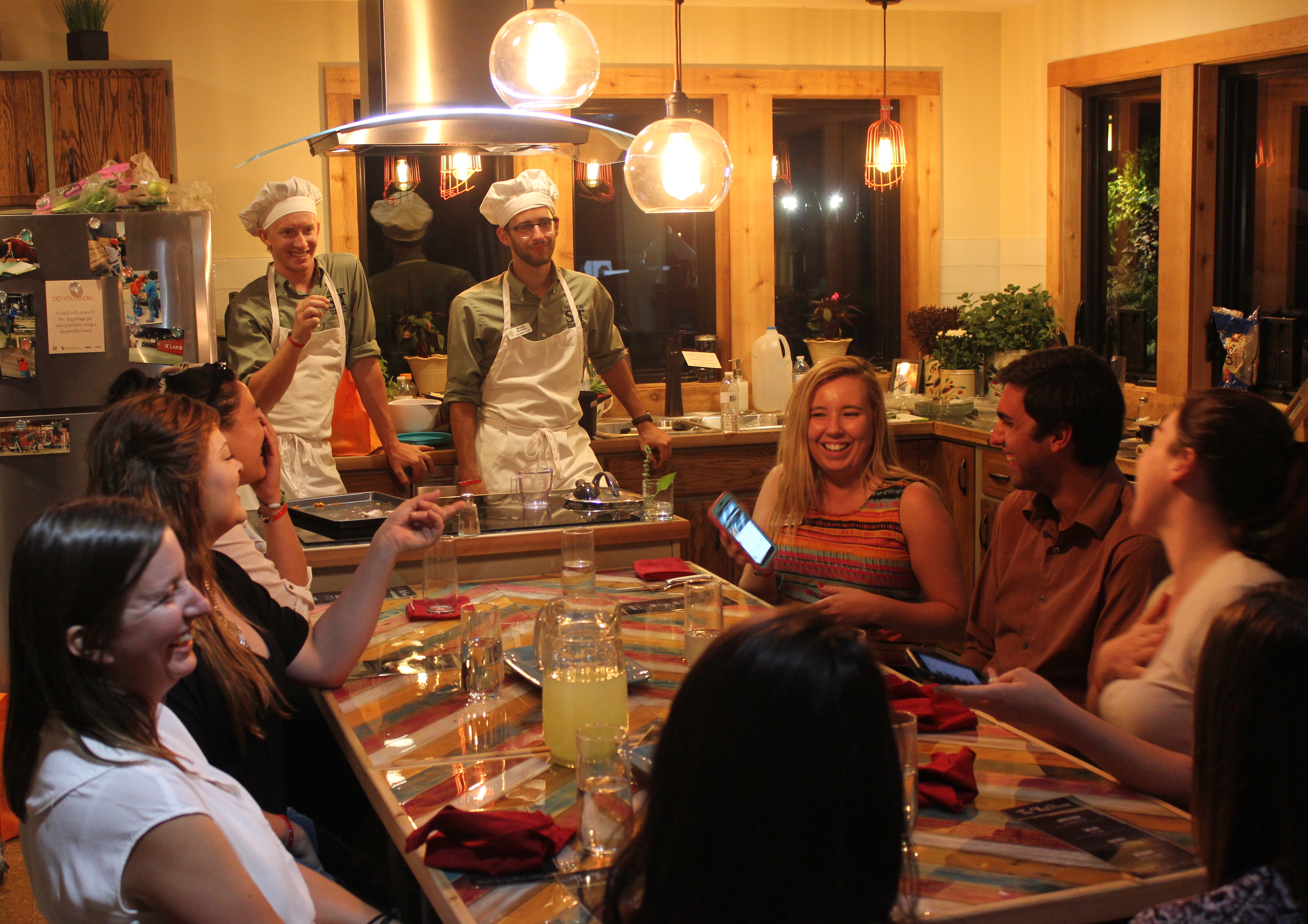 It is crazy being a host and trying to take care of everybody. Where if you’re a guest, what do you do? You have to please – you have to RSVP. That’d be nice. You know, you can ask, “Will there be a gluten-free option?” You can ask that. I mean, that’s iffy. I don’t know. Why don’t you just bring it yourself? Why not? Bring something – gluten-free, vegetarian often, whatever you need. Bring that along. And then you’re done. You’re a guest. You’re there to see what’s going on and to enjoy the experience and to see what the host has planned for you and enjoy the company of others. Such a different head.
It is crazy being a host and trying to take care of everybody. Where if you’re a guest, what do you do? You have to please – you have to RSVP. That’d be nice. You know, you can ask, “Will there be a gluten-free option?” You can ask that. I mean, that’s iffy. I don’t know. Why don’t you just bring it yourself? Why not? Bring something – gluten-free, vegetarian often, whatever you need. Bring that along. And then you’re done. You’re a guest. You’re there to see what’s going on and to enjoy the experience and to see what the host has planned for you and enjoy the company of others. Such a different head.
I think so much time in the church is wasted about us planning the dinner party and being the host, like we’re in charge. Presbyterians, we know we’re not in charge. We’ve got that whole predestination thing going. You can’t upset us because it’s all in God’s plan. You know what the Presbyterian said when he fell down the stairs? He said, “Oh, thank God that’s over.”
I mean, what are you going to do? You’re not in charge. Presbyterians, our absolutely fundamentally bedrock thing, convinced that we are totally unnecessary to God. And we will fight you to the death on that one, that God doesn’t need us at all. And that is a proper attitude to have when we’re doing church in that we’re not trying to tell other people how to work and how to act and where to sit. We’re not making the seating assignments. We don’t have the little place cards saying you go here; you go there; and you “um” supporters, you’re out here in the kitchen, and shut up, will you? That’s not us. We’re not the host. We’re a guest. We’re groping for God same as you. Same as you. And God doesn’t live in anything we make. God is not limited to the stuff that, in our imaginations, that we come up to. We’re all guests. Next one.
And this guy again. Christy, I hate when you yell like that because I can’t get any sleep in during the sermon. Zuckerberg. Zuckerberg wants everybody in the community. He wants half of Facebook in the community, and he’s got one out of 20. He wants to get one out of two. And he had this big summit because he’s figured out how to do it. And you’re going to be shocked. You’re going to be amazed. You’re going to be – you’re going to say, “What a revelation. The man’s a prophet.”
He has figured out – and this is a lot of metrics, a lot of deep data-type stuff. He’s figured out that people don’t join meaningful communities. People, oh, sure, they’ll join, come see the funny kitten pictures, you know, yeah, everybody joins that. But meaningful communities for support, meaningful communities for responsibility and accountability, people do not join them. They don’t volunteer to join. Mark Zuckerberg has found that people join meaningful communities when they’re invited by friends. Oh. Have we ever heard that in church before? It’s not “Build Facebook and they would come.” No. People come to a meaningful community when they’re invited by friends. And that was his whole thing. You guys have got to invite people in order to have a meaningful community. And you know what he says about Facebook is right what we’ve been saying in church. People don’t join meaningful communities unless they’re invited by a friend.
So guess what. You want more people in a meaningful community, and you want them to join you? You know, don’t tell them what to do. Tell them what you’ve done and say, I’m with you. I’m groping with God, too. I’ve found a community that helps me with that, helps me be a better me. I’ve found a community that will inspire me to be the best person that I can be. I’ve found a community that will motivate me, that will come up to me and tell me, here’s something you do. Here’s an opportunity for service. Here’s something we’re doing this Saturday. Can you come and help us feed? Can you come help us pack? Can you come and help us with this mission? Motivate us. I found a community that will help me when I need help. I found a community that supports me in prayers and in material support and in time. I found all this. Why don’t you come with me to this meaningful community? Go ahead, Richard, go to the last one.
All right. So your challenge, your homework is to see beauty where you used to see trash. Huh? Yeah? Try to appreciate when they bought the trash and put it in a bundle and put it on their porch intentionally. See the beauty where other people see trash, where you, you used to see trash. Where you used to be “us” and “them.” Find something common that you have. Find something you can get behind, that you can admire, that you can affirm. “I see you are very religious. I see you are very connected. I see.”
My daughter keeps up with her high school friends, her college friends, her friends from farm country. I don’t. I admire that. Can you do that, too? Because we’re all groping for God. We’re all searching for Sunday. We’re all guests at God’s banquet. God bless you in your search for Sunday. Go out and find someone to search with you. Amen.






 Christy Ramsey
Christy Ramsey

